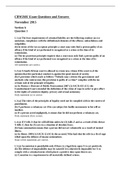CRW 2601
Yale Law School
All 4 results
Sort by

-
CRW 2601CRIMINAL LAW DOCUMENT BUDDLE
- Package deal • 5 items • 2022
-
 Havilah
Havilah
-
- $18.49
- + learn more
CRW 2601CRIMINAL LAW DOCUMENT THEORIES OF PUNISHMENT: ABSOLUTE THEORY: (a) Retributive The theory of retribution is purely retrospective and foresees on the crime that was committed in the past. RELATIVE THEORY: (a) Preventative (b) Deterrence (i) General deterrence (ii) Individual deterrence (c) Reformative • The emphasis is... [Show more]

-
CRW2601_EXAMPACK Question and answers
- Exam (elaborations) • 38 pages • 2022
- Available in package deal
-
 Havilah
Havilah
-
- $11.49
- + learn more
Table of Contents Nov 2015.......................................................................................................................................................2 June 2015 ..................................................................................................................................................9 Nov 2014.................................................................................................................................................16 Jun...

-
Criminal law CRW 2601 question and answers
- Exam (elaborations) • 52 pages • 2022
- Available in package deal
-
 Havilah
Havilah
-
- $9.99
- + learn more
CRW2601 EXAM PACK QUESTION PAPERS AND SOLUTIONS G.R. Tutorials Criminal law CRW 2601 Question 1 Answer the following question by choosing the correct answer a) According to the absolute theory, punishment is an end in itself, while according to the relative theories, punishment is a means to a secondary end. b) The effectiveness of the theory of general deterrence depends only on the severity of the punishment that is imposed on an offender. c) The “triad in Zinn” (the cr...

-
CRW2601 Exam Questions and Answers
- Exam (elaborations) • 33 pages • 2022
- Available in package deal
-
 Havilah
Havilah
-
- $11.49
- + learn more
1 (a) The four requirements of criminal liability are the following conduct (act or omission), compliance with the definitional elements of the offence, unlawfulness and culpability. (b) In terms of the ius acceptum principle a court may only find a person guilty of an offence if the kind of act performed is recognized as a crime at the time of its commission. (c) The ius praevium principle requires that a court may only find a person guilty of an offence if the kind of act performed was ...

How did he do that? By selling his study resources on Stuvia. Try it yourself! Discover all about earning on Stuvia


